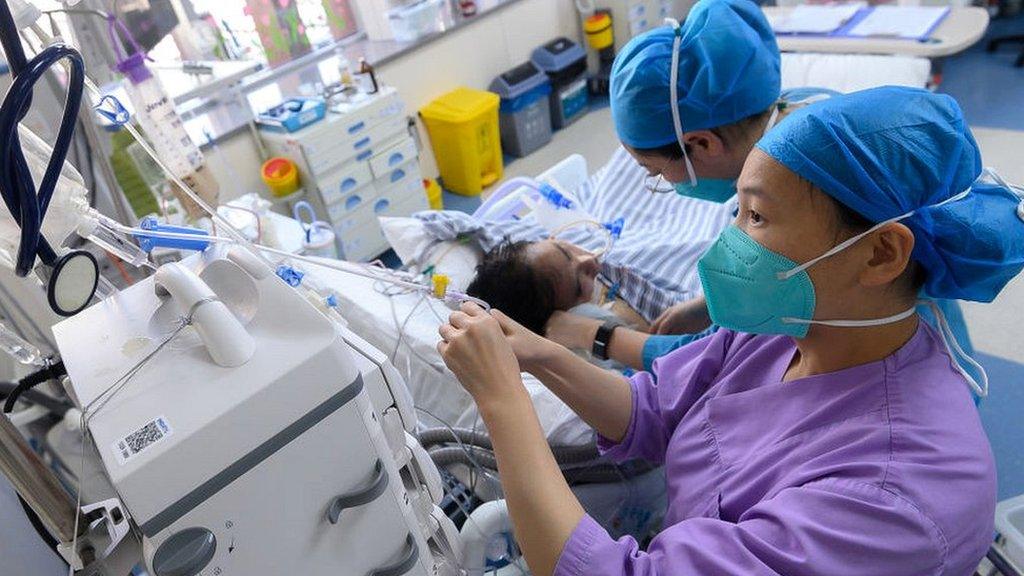Beijing 2022: Life inside the Winter Olympics bubble
- Published
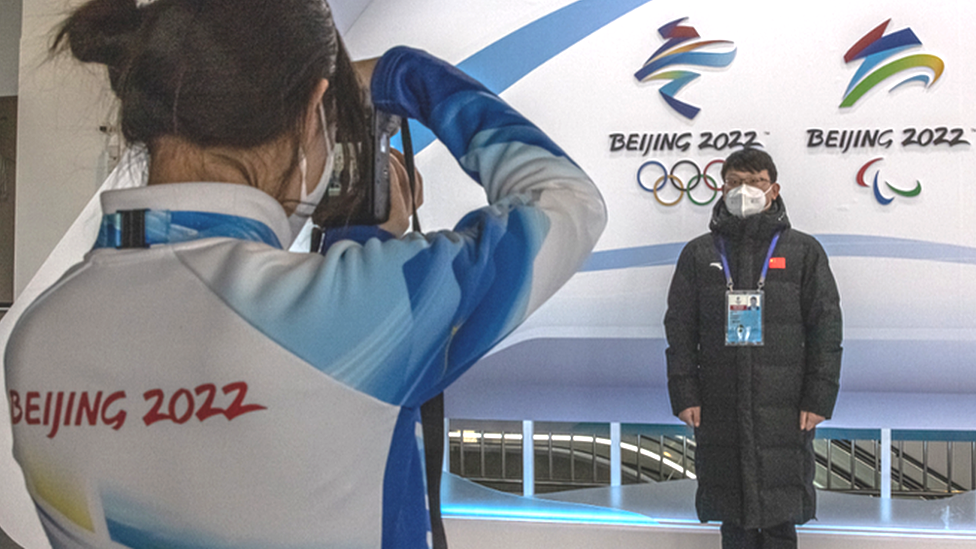
The Bejing Winter Olympics are operating in a contained environment to prevent Covid transmission
Robots serving drinks, temperature-controlled sleep pods and disinfectant everywhere.
These are the everyday scenes that Olympic athletes, officials and media covering the event will be living with for the next few weeks as the Winter Games get under way in the Chinese capital Beijing.
The 2022 Beijing Games are likely to be the most controlled international sporting event held to date.
The Tokyo Games last year proved that an Olympics could be conducted in a confined space in the age of the coronavirus pandemic. But China - wealthy, powerful and determined - has gone even further to create a vast system designed to ensure a virus-free Games.
Central to the whole plan is the "closed loop" environment - home to an estimated 60,000 athletes, team officials, media, volunteers and more.
The world of the Beijing Games is made up of three main gated "bubble areas" spread over a 160km (100 mile) area.
Each bubble is centred around a sporting venue and is connected via designated travel lanes. They encompass hotels, conference centres, worker dormitories and other facilities.
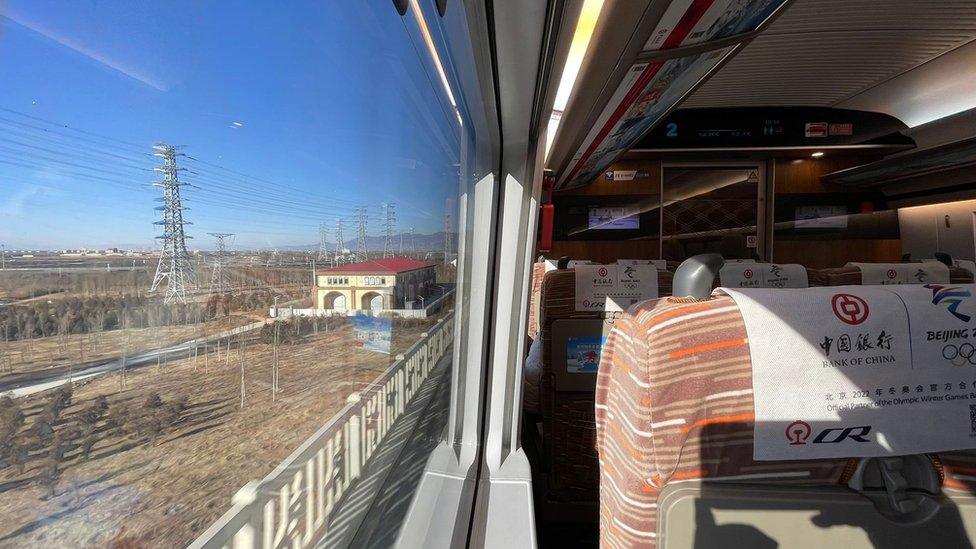
People travel from one bubble to another via designated high-speed trains
The BBC teams inside have described what daily life is like inside - attendees have to wear a mask everywhere except their own rooms and when eating, and maintain social distancing.
Everyone also undergoes a PCR deep-throat swab test every day which has to be recorded with the Games' My2022 health app.
"The understanding is that we don't get results unless we test positive. The proverbial no news is good news," says BBC producer Pratiksha Ghildial.
Out of the tens of thousands of people who've arrived so far, authorities have found about 300 cases - less than half in the closed loop.
Infected people are taken into isolation - and allowed to re-join the bubble once they test negative. Chinese officials have specified that their aim isn't zero cases, but zero spread - and so far the system has held up.
"The counter-Covid measures are extraordinary," says Ms Ghildial. "The other day I asked for a little repair in my room and a man in a bio-hazard suit turned up to do it."
Constant vigilance is the overriding theme.
Cleaners are constantly present in communal spaces and there are floor robots moving throughout, spraying disinfectant.
Our reporters note how during press conferences, a volunteer rushes up to wipe the microphone between questions.
At the sleep pods dotted around venues, teams will clean the cabin after someone's finished their nap.
"They provide disposable bedsheets in the cubicles," says another BBC producer, Christine Hah.
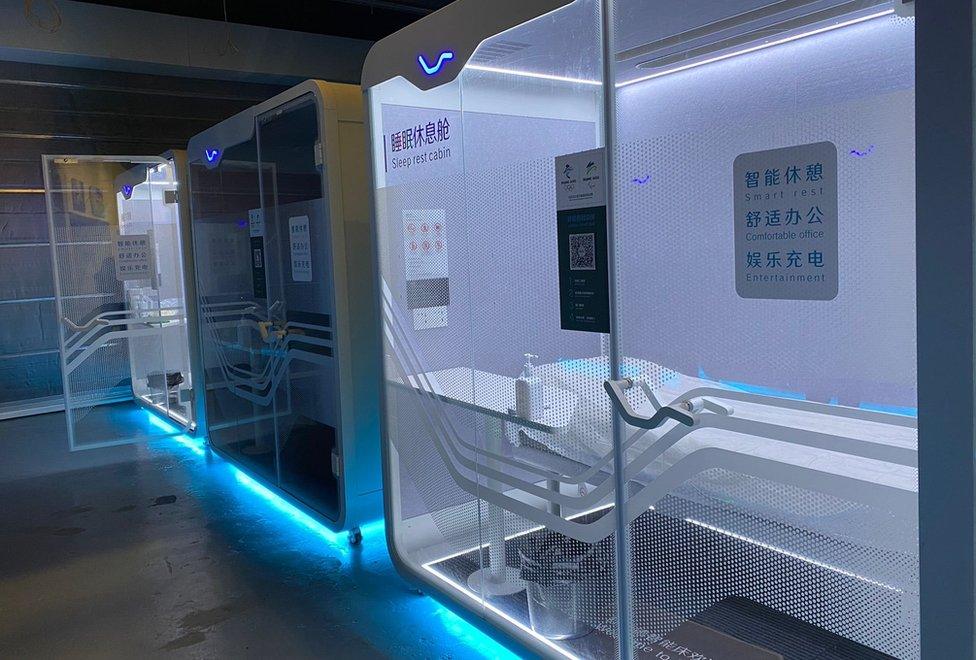
People can book in a quick nap if they need it at one of these constantly cleaned cubicles
China's technical wizardry has also created some novel tools aimed at reducing human-to-human contact.
People may be used to automated servers and pulley systems in Asia, but at these Games there are also robots in the kitchen and behind the bar, cooking and preparing a la carte drinks and meals.
"The pink and white robots seem more efficient than their human counterparts," reports Ms Ghildial.
"My colleagues who ordered from a robot got served much quicker than I did ordering from a human." She noted though that the flavouring needed a bit of finetuning.
In the vast media centre, the hall stretches on, lined with Olympic merchandise shops, "sky high" escalators and Games mascots suspended from the ceiling.
With the Lunar New Year this year falling the week before the Games, there are some traditional red decorations on the walls, and there are other cultural elements one can access - like a calligraphy table - where you can watch a machine paint Chinese strokes in the centuries-old style.
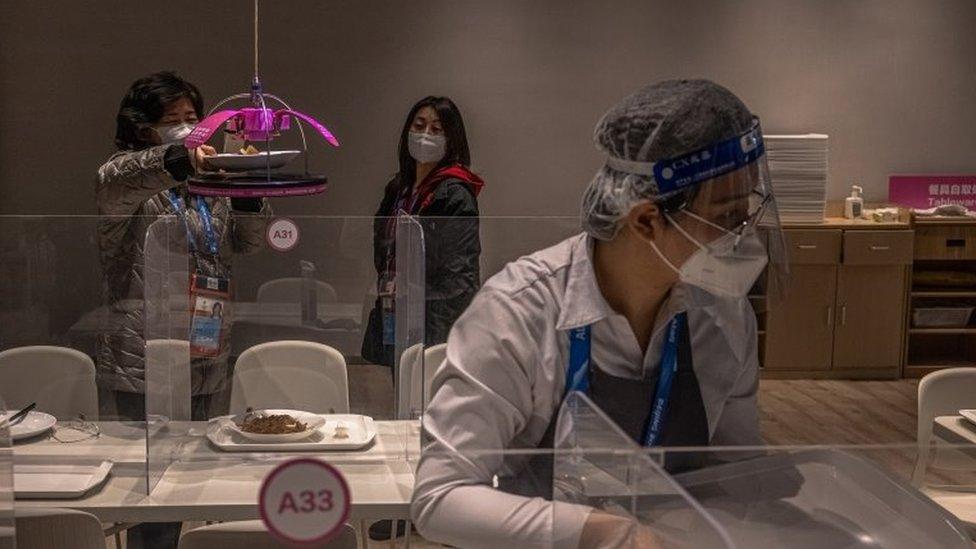
Dishes are delivered by an automated canteen robot...
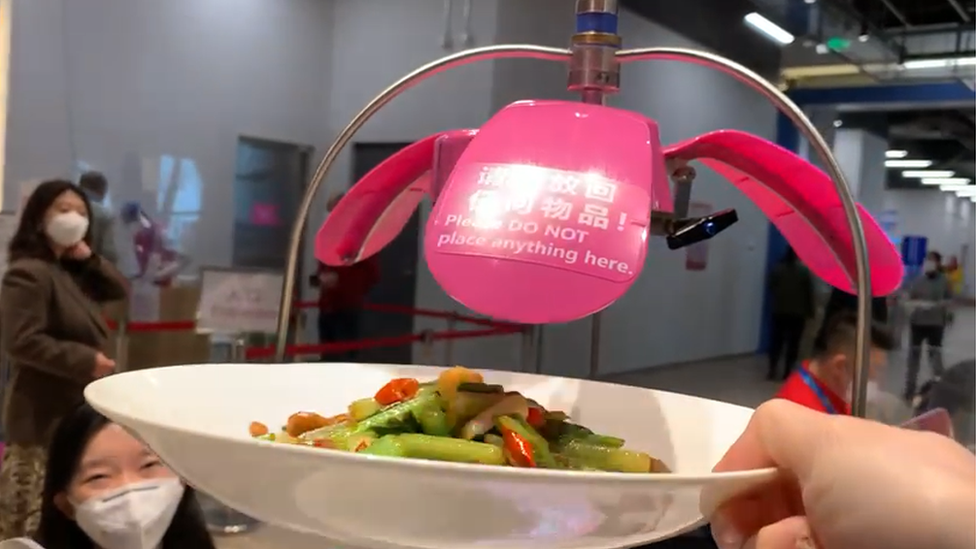
... which descends from the ceiling to serve hungry diners seated at their table
Local volunteers are also around to give directions and help. They don't live in the bubble's flashy hotels, but in dormitory-style accommodation.
Many are young people - who've also quarantined for the job three weeks prior to entering the bubble and are missing Chinese New Year reunions with family.
"Engineers told us how workers living in temporary housing next to the satellite facilities are woken up every morning by a supervisor's whistle, then they all stream out of those rooms and gather in neat rows in the courtyard for the morning roll call," Ms Hah said.
As always, the dedication of local workers is appreciated, particularly at a Covid Games where athletes have limited spectators and very little opportunity to engage with locals.
Life inside the hermetically-sealed bubble has its quirks but overall, is so controlled and regimented that it creates a sterile atmosphere at times.
Reporter Alex Capstick, attending his ninth Olympics, says the compulsory testing and mask wearing were also in place in Tokyo "but that's where the similarities end".
"In Tokyo we had the opportunity to walk from our hotel to the local 7-Eleven... and after 14 days we were allowed to eat and drink wherever we wanted.
"There's none of that in Beijing. Hotel, bus, games venue, that's it. It's called a 'closed loop' for a reason - there is no way out. I'm still getting used to it but at least the buses run on time and everyone seems friendly."
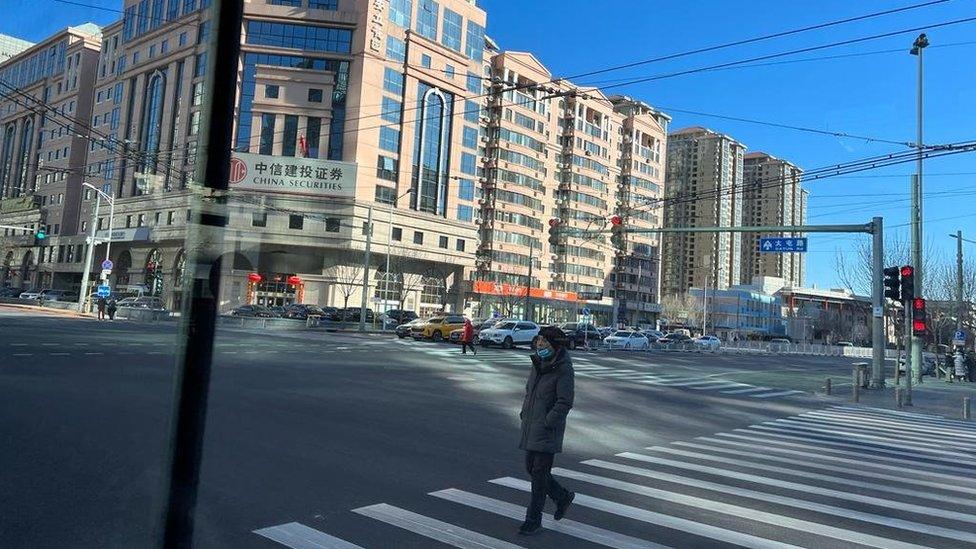
A glimpse of the outside world as our journalists zoom from one insulated venue to another
Such a controlled indoors is actually helpful for athletes, some have said, especially the individuals focused on the best possible preparation for their event.
But for others, it's a far cry from the partying and festivities that normally characterise the Olympics.
The frigid temperatures of Beijing's winter also keep people inside.
"We tend to savour every bit of sunshine we can soak up since we are mostly indoors - [so that's] mainly when we walk to and from our shuttle bus," says Ms Ghildial.
Games attendees are among the only foreign visitors that have been allowed into China since the pandemic began.
But the only glimpses Games attendees are able to get of the "real" China are on their shuttle commutes each day from their hotel to the venues and back again.
"So much has been said about the rise of China in the last decade that I can't help but be fascinated by observing the tall buildings, the people living and working inside them - and other little glimpses of life here," says Ms Ghildial.
"I look forward to that 20-minute ride every day as that is my only chance to see the real Beijing from inside a bubble."
As told to Frances Mao

Beijing is enforcing enormous, strict separation bubbles to combat the risk of Covid.
- Published4 January 2022
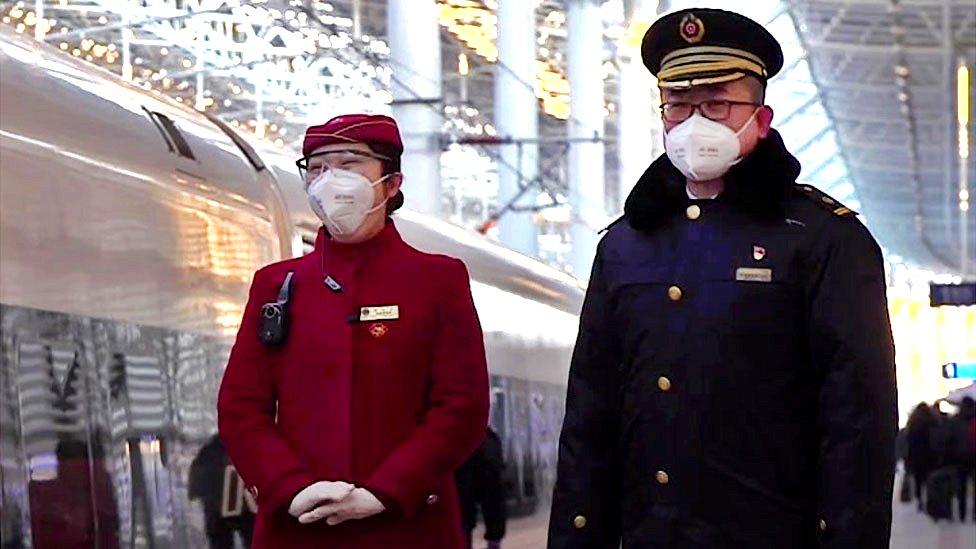
- Published31 January 2022
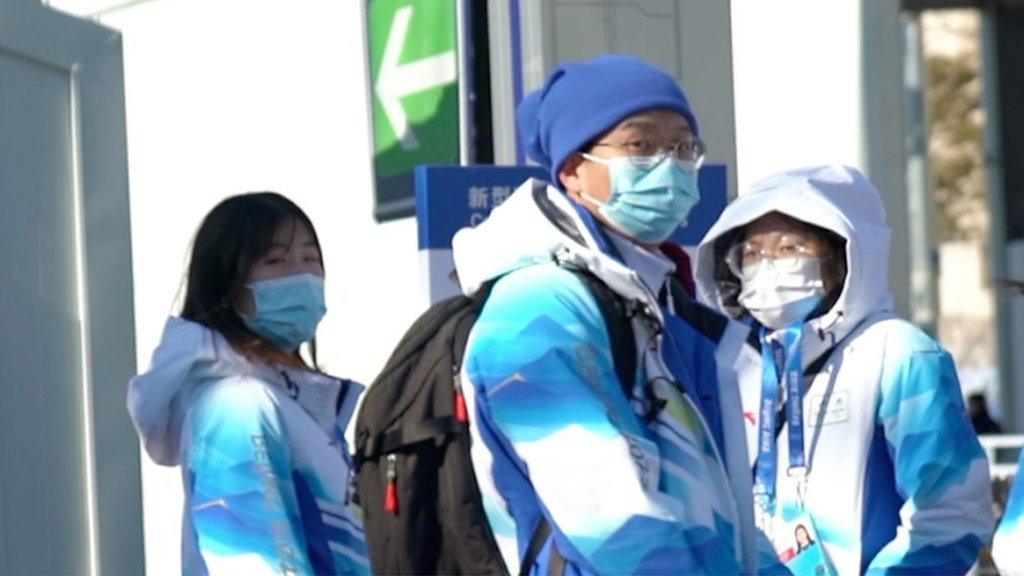
- Published25 January 2022
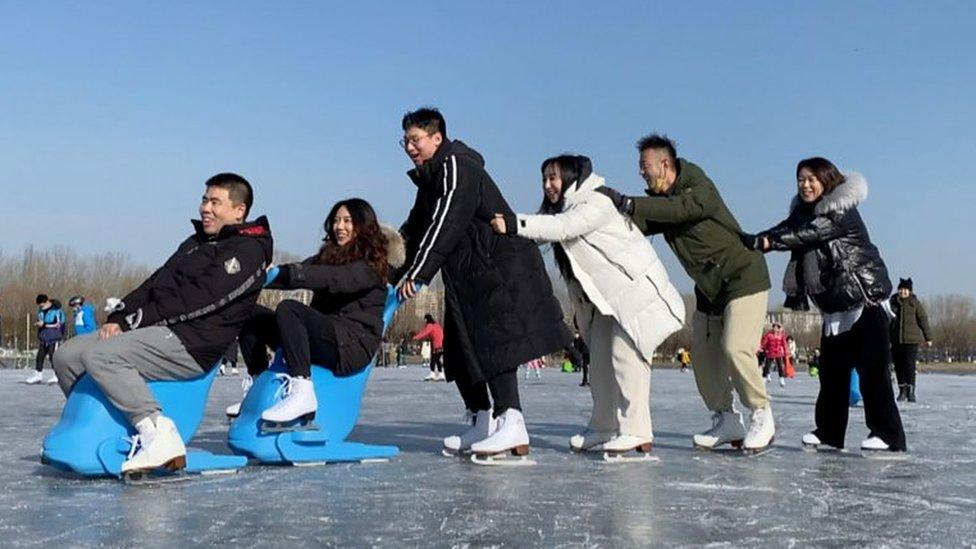
- Published24 January 2022
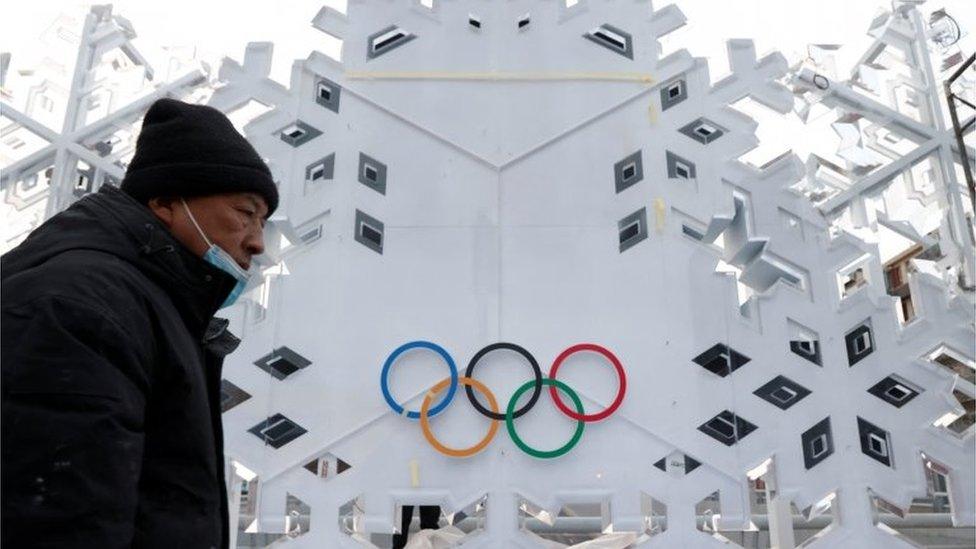
- Published16 January 2023
